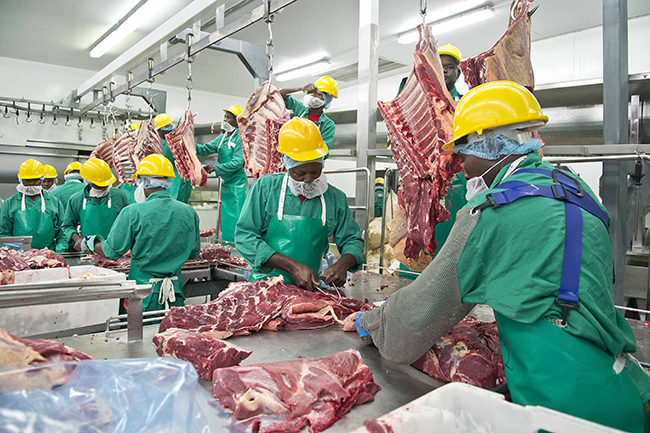Aletta Shikololo
The future of state-owned meat-processing and marketing company Meatco has seen heated debates for months. With the entity in financial distress, many have suggested options ranging from reviving, privatising or liquidating it. However, all eyes are now on the government as stakeholders anxiously await its decision.
The pressure is mounting on the authorities to make a pronouncement on the fate of Meatco, which has been struggling to stay afloat amidst tough economic conditions, mounting debt and more competition.
Speaking to New Era yesterday, the entity’s CEO Mwilima Mushokabanji said they are still waiting on finance minister Iipumbu Shiimi to make a pronouncement.
“We haven’t sat yet to discuss the issues around Meatco, so we are still waiting on him,” he said in a telephonic conversation.
Mushokabanji was responding to enquiries regarding Shiimi’s recent statement on Twitter about government plans to restructure Meatco.
In his tweet, Shiimi dismissed widespread talks about the possible privatisation or liquidation of Meatco, labelling the talks as “fake”.
Although he acknowledged a need for the entity to be restructured, he emphasised the government’s commitment to support the struggling enterprise.
“It is true Meatco needs restructuring to become sustainable, and we are working on a sustainable plan,” he stated.
The ministry needs to be more responsive regarding the exact plan to revive the entity, despite numerous attempts to obtain comments from both the minister and the ministry for the past weeks.
The spokesperson for the ministry, Wilson Shikoto, informed New Era this week that to his knowledge, there have been no discussions between Meatco and the ministry yet.
However, he also mentioned that he was still gathering more information on the matter, and urged the media to be patient until such time that Government pronounces itself.
Earlier this year, agriculture minister Calle Schlettwein drew wide attention to the cash-strapped entity by stating that the company was in the intensive care unit (ICU), and that the government would have to decide on whether to keep it on life support or not.
This week, he said he believes it is high time for Meatco to re-strategise and reposition itself as a modern entity to counter escalating competition.
With more input and influence from private enterprises such as Beefcor Meat Suppliers and newcomer Savanna Beef Processors, Schlettwein is convinced it can no longer be business as usual for Meatco. Current circumstances call for the State-owned entity to urgently revisit its strategy and outlook, he reasoned.
Schlettwein was speaking at the ministry’s annual week-long planning workshop held at Swakopmund last week, where he was joined by the ministry’s senior officials and various stakeholders from the meat-processing and marketing sector.
“Competing is getting tough locally, and that shows Meatco’s decades of monopoly ended. Now, things need to be done differently. Farmers must benefit from Meatco, and efficient ways of doing business must be fast-tracked. At one point, Meatco was offering good prices to farmers but they always paid the farmers late, and that delay in payments caused problems in the relationship. So, new and effective ways of doing business will be the way forward,” he emphasised.
Numerous reasons have been cited as potential factors which could lead to the demise of Meatco, a crucial entity in the Namibian livestock sector.
These include the entity’s continued precarious financial situation, and the apparent exclusion of the northern communal areas (NCAs) from having a voice in its operations.
Additionally, the arrival of Savanna, a corporation of private beef producers, has been viewed by some as a direct threat to Meatco’s existence.
These factors, amongst others, have created an avalanche of concerns regarding the future viability of the parastatal.
For the 2023-2024 financial year, Shiimi allocated N$66.7 million for the broke entity.
During the tabling of the budget in February, he announced that they were analysing a forensic report conducted by a local firm to assess the state of affairs and viability of Meatco.
The goal was to ensure the long-term sustainability of the beef sector. However, as of now, the report has not been made available to the public.
Sharing his thoughts on Shiimi’s recent statement, opposition leader McHenry Venaani said decisions regarding public institutions and assets are not made on Twitter, but through Cabinet.
In addition, the Popular Democratic Movement head noted that Shiimi had not briefed Cabinet on the matter, making his statement seem as lacking in substance.
“When the government wants to liquidate State assets or make decisions regarding public institutions, Cabinet takes decisions. At this point, he (Shiimi) is informing us on Twitter. The government should not operate that way,” Venaani observed.
“Shiimi should come to the legislature and explain to us so that we have a look at the books, and see what’s happening and how they want to revive the institution. Sometimes, reviving institutions has proven to be more difficult than closing down. But we are saying that the northern regions are suffering without the markets.
“So, why can’t Meatco run where they are capable…the northern regions? For it to become profitable, we need to build a buffer zone between Namibia and Angola so that the red line can become a thing of the past, and therefore make the sustainability of Meatco viable,” he added.
He said he had requested to meet Meatco’s board three weeks ago, but they have not responded to him hitherto.
However, in recent interviews with New Era, Mushokobanji has always remained resolute, insisting that the company’s revival strategy is on the right track.
The company has developed a new strategy in collaboration with the Directorate of Veterinary Services in the agriculture ministry.
This new strategy aims to allow meat from the north to be consumed south of the red line, marking a significant step towards Meatco’s recovery.
– ashikololo@nepc.com.na



